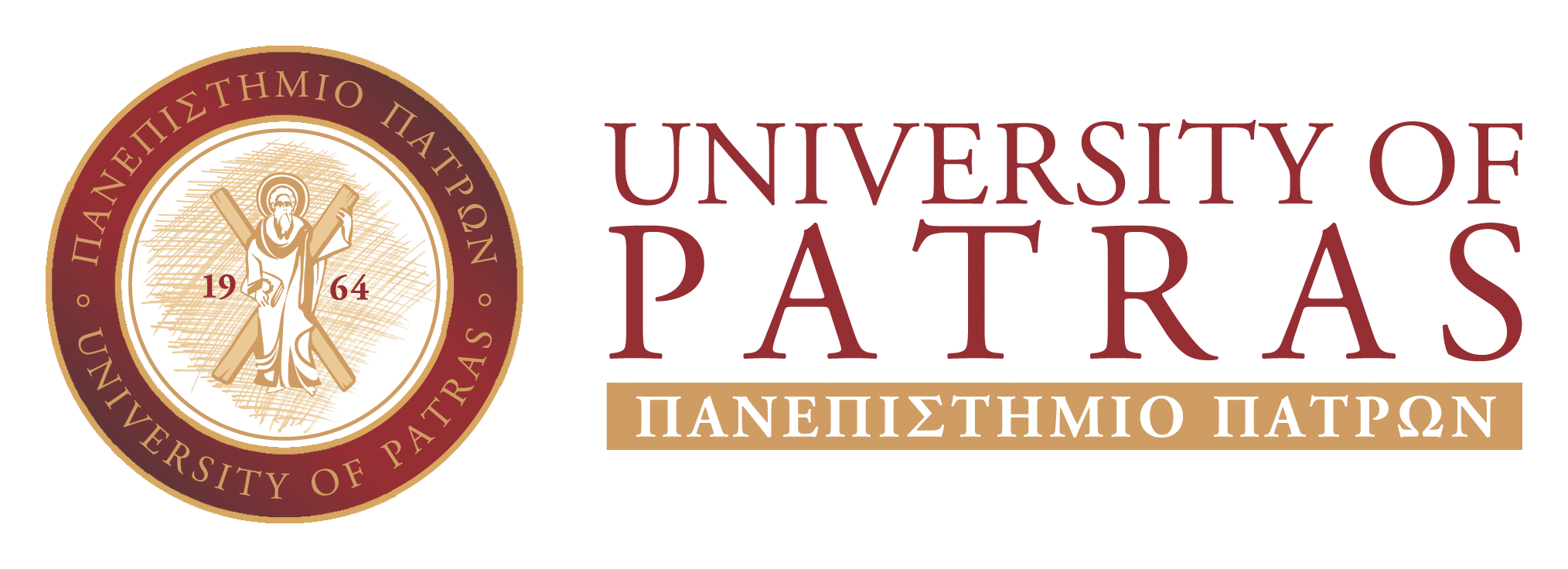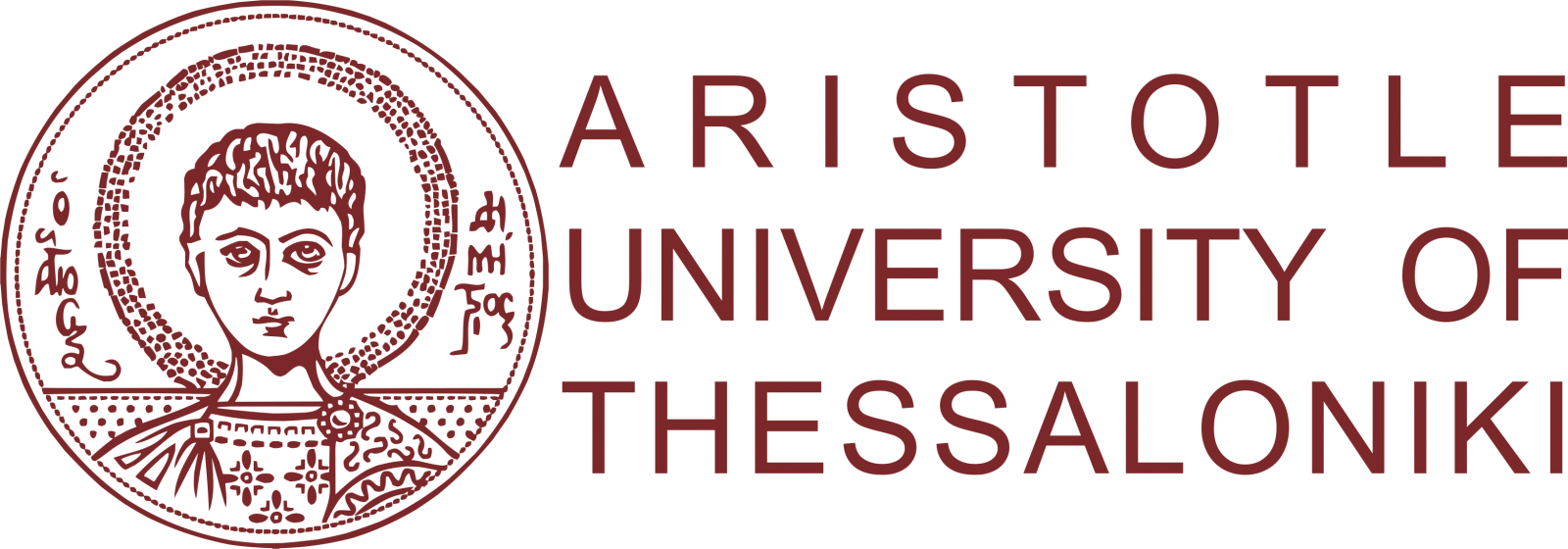Coordinator
UNIVERSITY OF PATRAS
The Organization
The University of Patras is an Institution of Higher Education recognized both on a pan-hellenic and international level, thanks to its multidisciplinary and innovative activities in areas such as natural and health sciences, humanities and social sciences. Located at the boundaries of the city of Patras, on northwest Peloponnese, the University is surrounded by a beautiful natural environment and contributes to the development of the wider region. Founded in November 1964, the University was expanded by the incorporation of the University of Western Greece in 2013 and the Technological Institution of Western Greece in 2019. Today, the nine schools and 38 departments of the University are mainly located at Rio, while some are located at the cities of Agrinio, Mesologgi, Aigio, Pyrgos and Amaliada of the Western Greece Region. Since its foundation, the University has been internationally orientated and has adopted the European Strategy.
FOOD BIOTECHNOLOGY GROUP
The Food Biotechnology Group of the Department of Chemistry is one of main research groups of the University of Patras that focuses on food biotechnology. The Group has a considerable wealth of experience in food analysis, fermentation technology, oenology, cell immobilization and constitutes the coordination hub of the research infrastructure.
CATALYSIS GROUP
The Catalysis Group of the Department of Chemistry has extensive experience in synthesis, identification and evaluation of nano-structured catalysts and other material (e.g. absorbers from residual biomass) for the protection of the environment. The research group focuses on the development and evaluation of new carbonated materials - absorbers from agro-industrial by-products for use in environmental applications.
LABORATORY OF ANALYTICAL CHEMISTRY
The Laboratory of Analytical Chemistry team of the Chemistry Department has developed strong, multi-dimensional and inter-disciplinary research activity in cutting-edge fields. Exploitation of nanotechnology for new analytical methods, biosensors, microanalytical chips, instrumentation of DNA microarrays, automation of chemical analyses, application of recombinant DNA technology for the production of new probes and composition of nanoparticles constitute the main research interests of this team.
LABORATORY OF BIOCHEMISTRY
The Laboratory of Biochemistry team of the Chemistry Department studies the biochemistry and molecular biology of Escherichia coli. Significance of the toxin/antitoxin MqsR/MqsA system on cell metabolism, normal substrates of bacteria glutaredoxins, potential inhibitors of thioredoxin reductase as potential antibiotics are the basic research areas of this team.
LABORATORY OF PROCESS ENGINEERING AND OPTIMIZATION
The research team of the Laboratory of Process Engineering and Optimization of the Department of Chemical Engineering focuses on the development of early-stage mathematical modeling processes and their incorporation into commercial simulators (such as UniSim, Aspen, SuperPro, Matlab, GAMS). Significant work has also been performed in linking early experimental results with the economic and environmental assessment of the respective technologies on an industrial scale, the systematic optimization of industrial systems both at the level of strategic planning and at the level of optimization of the mechanical design and operation of the respective units.
Partners
UNIVERSITY OF IOANNINA
The Organization
The University of Ioannina was founded in 1964 and in 1970 it became an independent Institute of Higher Education, that developed rapidly over the next years. Located at the boundaries of the city of Ioannina, the University consists of seven schools and fifteen departments, with a student population of 18,356. Most of the schools at the University have organised post graduate courses, in which the student population adds up to 1.431, plus an additional 1.997 students at a doctoral level. In the last years the University of Ioannina has increased by approximately 2-fold due to the establishment of new departments and its prospects for development are especially promising.
ENZYME BIOTECHNOLOGY GROUP & GENETIC ENGINEERING GROUP
The Enzyme Biotechnology Group and the Genetic Engineering Group function as a cooperative research unit between the Department of Chemistry and the Department of Biological Applications and Technologies of the University of Ioannina. The research carried out by the Enzyme Biotechnology Group and the Genetic Engineering Group is performed in two discrete laboratory rooms; the Enzyme Biotechnology laboratory where research focuses on the field of enzymatic kinetics and the Enzymatic Kinetics laboratory where research focuses on the field of Enzymatic Engineering. The groups specialize in enzymatic catalysis, enzymatic biotechnology, microbial biochemistry and biotechnology, fermentations and biochemical processes using methods of molecular designing.
AGRICULTURAL UNIVERSITY
The Organization
The Agricultural University is the third oldest University of Greece, after the National Kapodistrian University of Athens and the National Metsovian Technical University. It was founded in 1920 as an independent Institution of Higher Education under the name Higher Agricultural University of Athens. The Higher Agricultural University of Athens evolved into the Agricultural University of Athens (AUA) consisting of 6 schools and 16 departments located at the city of Athens. The AUA provides a high level of teaching and research work at an undergraduate and postgraduate level in the fields of Agricultural Sciences. The Institution's vision is to have a dynamic presence in the international academic environment and to respond to the productive and developmental needs of the Greek economy and society.
LABORATORY OF PROCESS ENGINEERING AND PRESERVATION OF FOOD
The Laboratory of Process Engineering and Preservation of Food, is one of the seven Laboratories of the Department of Food Science and Technology. The main interests of the research team involve food preservation techniques, basic food processing technologies and procedures, food industry equipment, food packaging, designation of food processing and preservation units, physical properties of food and oenology.
LABORATORY OF FOOD CHEMISTRY AND ANALYSIS
The Laboratory of Food Chemistry and analysis of the Department of Food Science and Technology has a research focus on the development of innovative analytical techniques for the quality control of foodstuff with an emphasis on the chemistry of lipids. Other research interests involve the development of innovative techniques for the isolation and identification of the volatile components of food (olive oil, bread, wine, fermentation products) as well as of the essential oil of aromatic plants, the determination of toxic substances in food, the isolation and identification of natural antioxidants and the assessment of their properties.
DEMOCRITUS UNIVERSITY OF THRACE
The Organization
Founded in July 1973, the Democritus University of Thrace (DUTH) was named "Democritus" in honour of the ancient Greek philosopher who hailed from the town of Abdera in Thrace. The administration offices of the DUTH is based in Komotini, which is the capital of the Administrative Region of Macedonia and Thrace. Today the DUTH comprises of eight schools and eighteen departments located at four cities of Thrace, Komotini, Xanthi, Alexandroupoli and Orestiada. The total student population is 15,000. The DUTH plays an important role in strengthening the national and cultural identity of the region of Thrace, and contributes to the high level of education in Greece.
LABORATORY OF MICROBIOLOGY, BIOTECHNOLOGY AND HYGIENE
The Laboratory of Microbiology, Biotechnology and Hygiene of the Department of agricultural Development was established in 2002. The team’s main research interests include the utilization of agro-industrial residues and wastes of the food industry to produce high-added value products, the study of the microbial and chemical characteristics of food, beverages and water, the study of biotechnological applications on food, juice, beverages and dairy products, the assessment of the hygiene and safety of food processes and products, the spread of antibiotic resistant microorganisms in foods and the environment and the antimicrobial properties of natural products and agents.
LABORATORY OF APPLIED MICROBIOLOGY & BIOTECHNOLOGY
The Laboratory of Applied Microbiology & Biotechnology of the Department of Molecular Biology and Genetics was established in 2015. Main research interests of the laboratory team include the isolation and identification of new probiotic microorganisms, the exploitation of agricultural and industrial residues and wastes from the food industry for the production of high-added value products, the application of innovative technologies for the integration of prebiotic dietary fibres and probiotic microorganisms in traditional foods and the study of the beneficial effects of functional foods on health (antioxidant/anti-cancer effect, effect of the intestinal microbioma in healthy populations and in populations with metabolic diseases, e.t.c.).
HAROKOPIO UNIVERSITY
The Organization
The Harokopio University, originated from an educational institution established in 1929, gained the status of University in 1990. Located in the centre of Athens in the foundation of the national beneficiary Panagis Charokopos, the University consists today of three schools and four departments. The Department of Nutrition and Dietetics of the School of Health Sciences was established in 1994. The design and entire development of the University has been based on international standards. The central facilities of the University are located at 70 Eleftheriou Venizelou Ave, in Kallithea and in 2011 one more building was inaugurated in Tavros. The Harokopio University has robust buildings and technological infrastructures as well as a high level of research activities and an international presence that ensures a high-quality academic environment for its students.
LABORATORY OF CHEMISTRY-BIOCHEMISTRY AND FOOD CHEMISTRY
The Laboratory of Chemistry-Biochemistry and Food Chemistry of the Department of Nutrition and Dietetics is involved in chemical and physical-chemical analyses of food and in enhancing their beneficial effects on human health. The research group specialises in the study of the chemical and physicochemical properties of foods and in the demonstration of their nutritional value. Main research interests of the group include the assessment of traditional mediterranean and functional food with particular emphasis in the determination of bioreactive micro- and macro- ingredients employing human and animal interventional studies, the rheology properties of food products, phase transition studies, the assessment of the organoleptic characteristics of food as well as embedment of bioactive micro-ingredients in a series of substrates – receptors (cyclodextrines, amended etc.). The group also has significant experience in developing new products and in transferring laboratory data from novel technologies to an industrial scale.
ARISTOTLE UNIVERSITY OF THESSALONIKI
The Organization
The Aristotle University of Thessaloniki was founded in 1925 and is the largest Greek university. The main campus is located in the city centre and occupies an area of 430,000 m2, while some of its academic and administrative facilities are located outside the campus or in other cities. In total the University includes 10 schools consisting of 40 departments and 1 single-department school. The University has 61 Clinics (Medical, Dentistry, Veterinary), 295 statutory laboratories and 23 study rooms. The Central Library of the Aristotle University of Thessaloniki, one of the largest in the Balkans, together with the 45 regional libraries of the departments and schools (17 of which are statutory) constitutes the library system of the Aristotle University of Thessaloniki.
DEPARTMENT OF FOOD SCIENCE & TECHNOLOGY
The Department of Food Science and Technology (DFST) of the School of Agriculture, Aristotle University of Thessaloniki, is located in an independent building of 2,000 m2. It consists of five fully equipped laboratories (Food Chemistry & Biochemistry, Dairy Technology, Food Processing & Engineering, Food Microbiology and Hygiene, Oenology and Alcoholic Beverages). Furthermore, DFST facilities also include pilot plants of food processing and preservation. The Department offers important services to the Food Industries and other product stakeholders in areas such as: Food analysis, New product design and development, Packaging requirements, Process Engineering, Product Shelf life Determination, Nutritional evaluation of food products and consumer dietary patterns. In the DFST, seminars, for food industry executives and other personnel, are held regularly. Finally, the members of the DFST have extensive experience in managing and implementing research projects funded by National and European funds, and also by the Food Industry. Thematic areas (research, education) of DFST include Food Chemistry, Food Physics, Meat and Fish Technology, Dairy Technology, Cereal Technology, Vegetable – Fruit Technology, Oenology and Alcoholic Beverages, Food Microbiology and Food Engineering.
IONIAN UNIVERSITY
The Organization
Today the Ionian University is a modern educational institution consisting of five departments in three islands; Kefalonia, Zakynthos and Lefkada. Due to its specialties and staff, its graduates are able to acquire specialised scientific knowledge and attain their career goals. In particular, the departments are involved in the following areas of applied sciences and arts: a) Food Technology, b) Business Administration, c) Digital Media and Communication, d) Sound Technology and Musical Instruments, e) Environmental Technology. The main strategic goal of the Ionio University is to provide higher education and to constitute a key driver for growth and bridging with the aim of transferring knowledge and know-how.
FOOD CHEMISTRY, MICROBIOLOGY & INDUSTRIAL FEREMENTATIONS GROUP
The research group of Food Chemistry, Microbiology and Industrial Fermentations of the Department of Food Technology specializes on the isolation and study of microorganisms in food processing and byproducts exploitation. Main research interests of the group include the isolation of “wild-type” microorganisms with a food biotechnological application, the exploitation of by-products and wastes of food industries using microbial applications, microbial fermentations in combination with qualitative and quantitative analysis of food and renewable sources, metabolic products and phenolic ingredients and the development of modern biorefineries.








